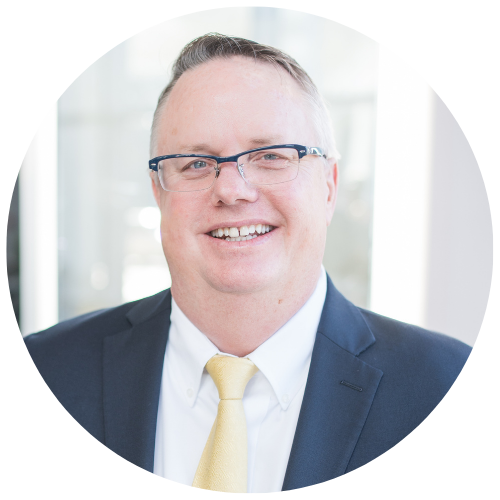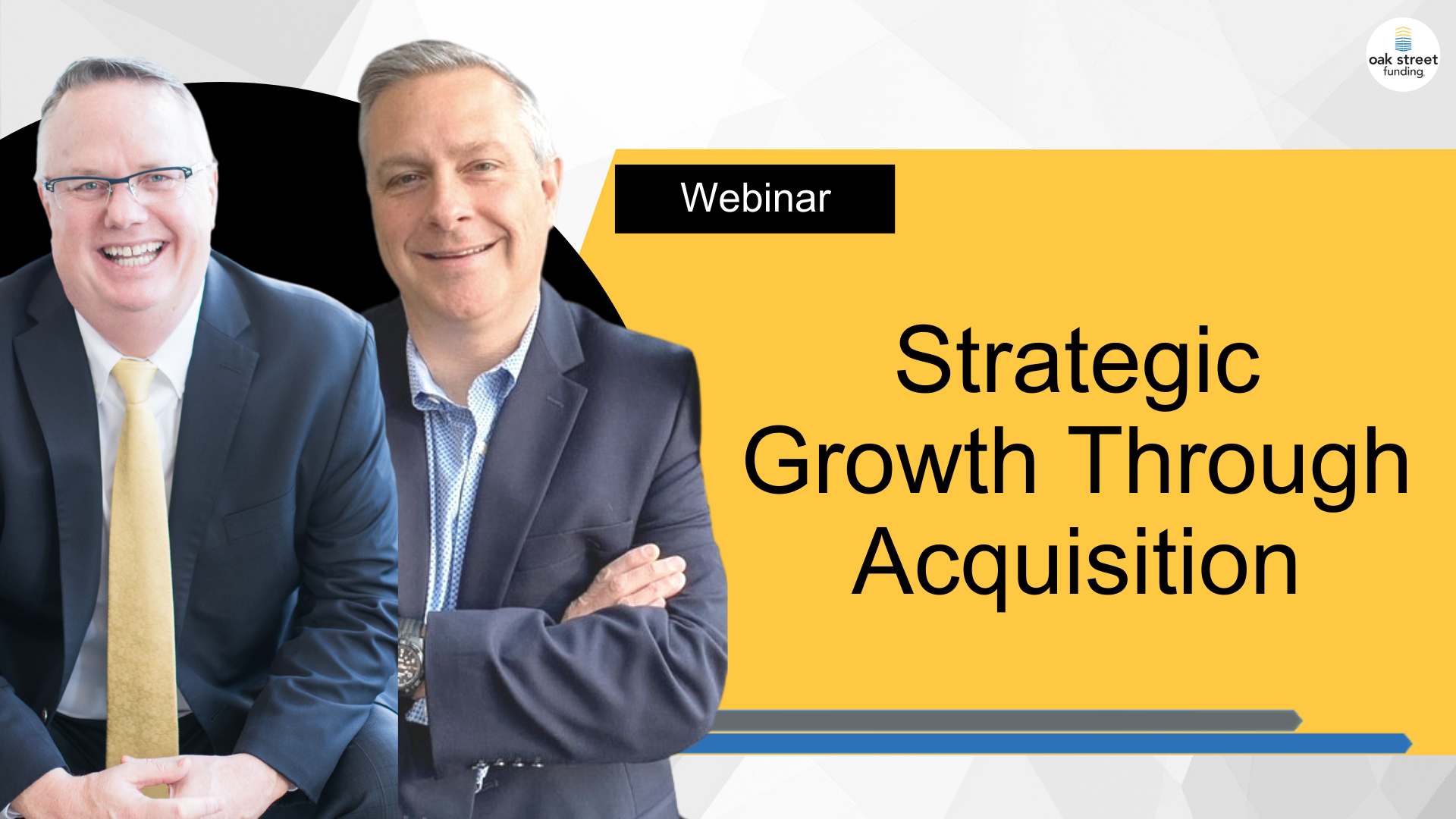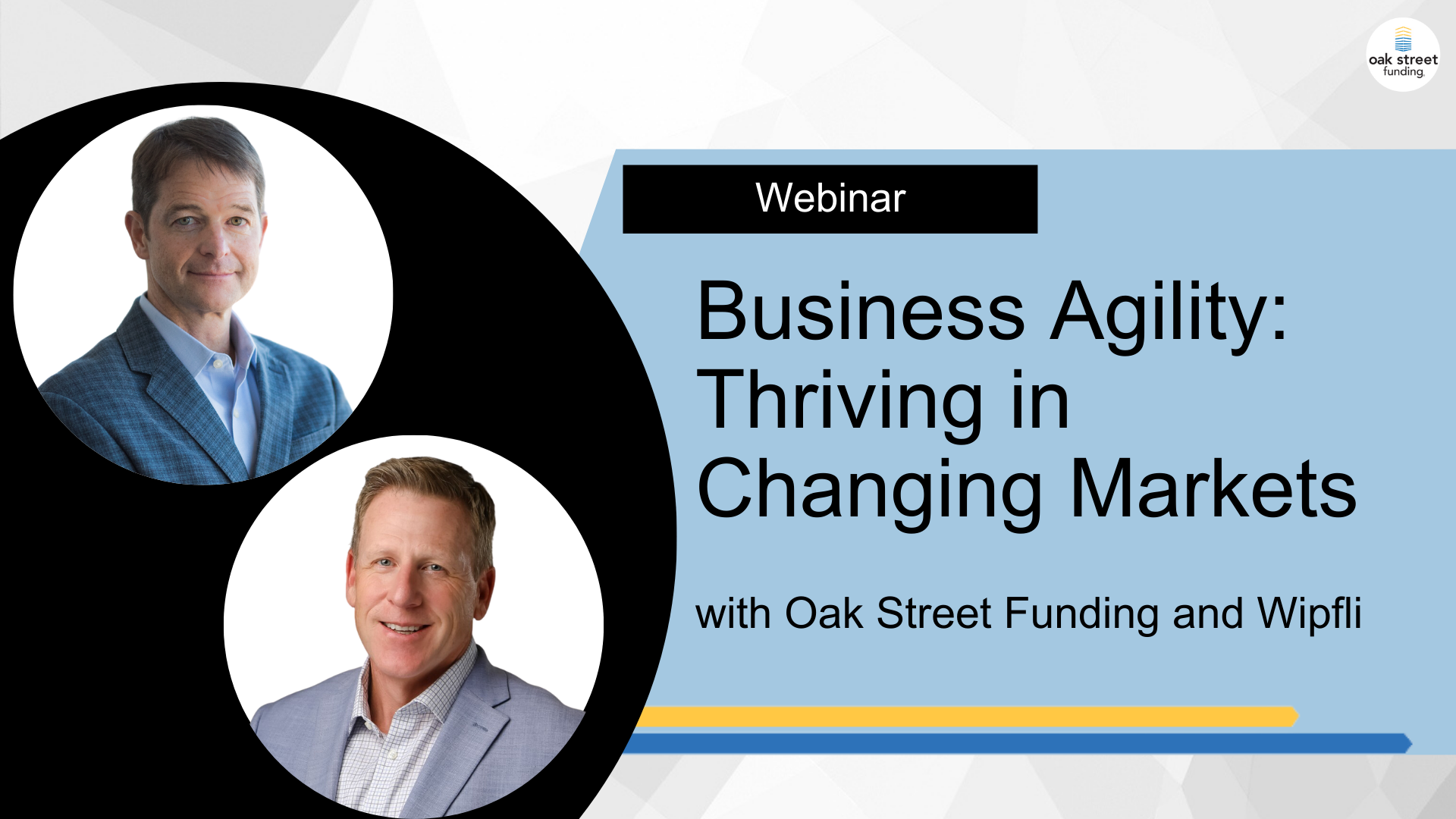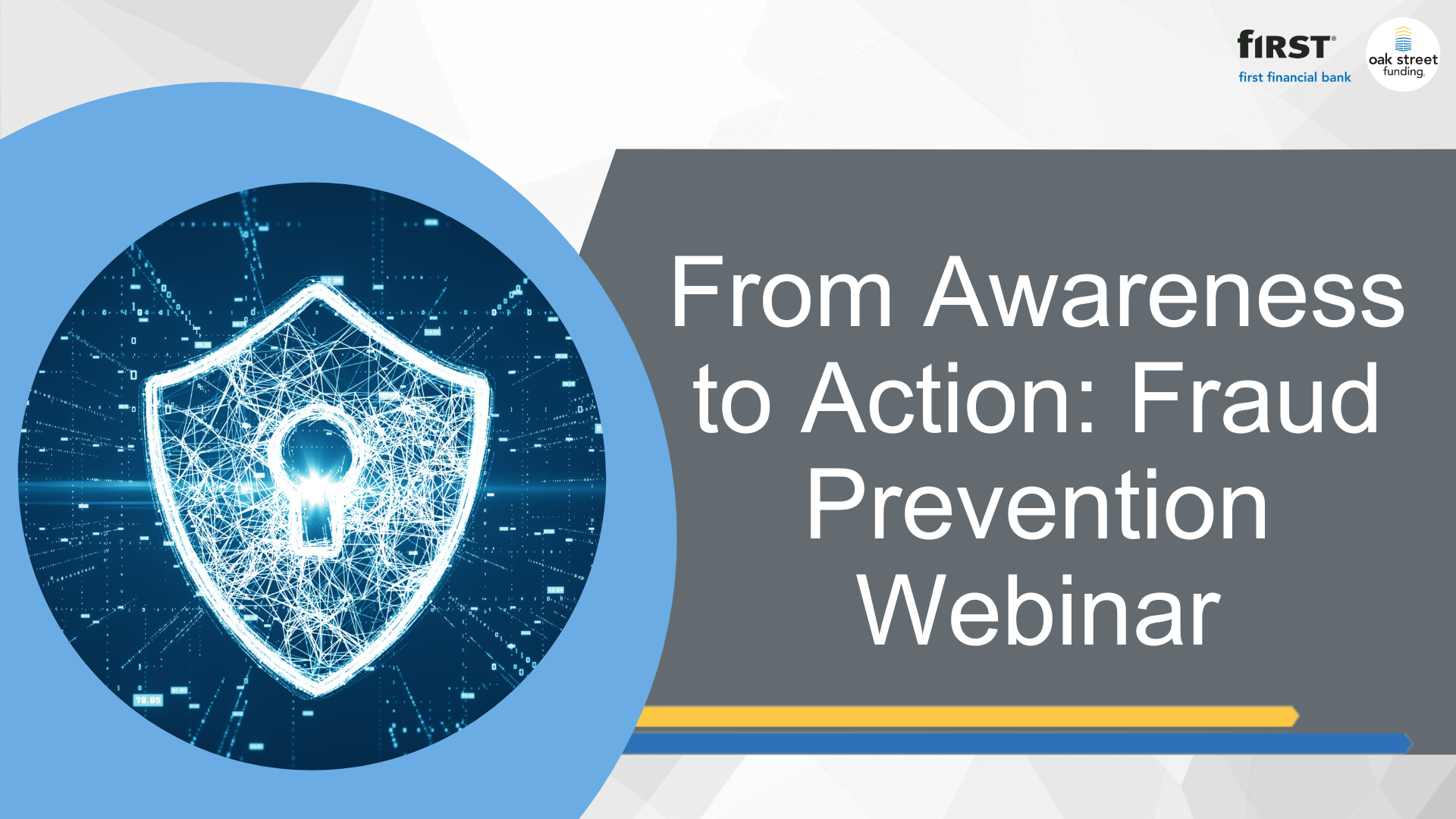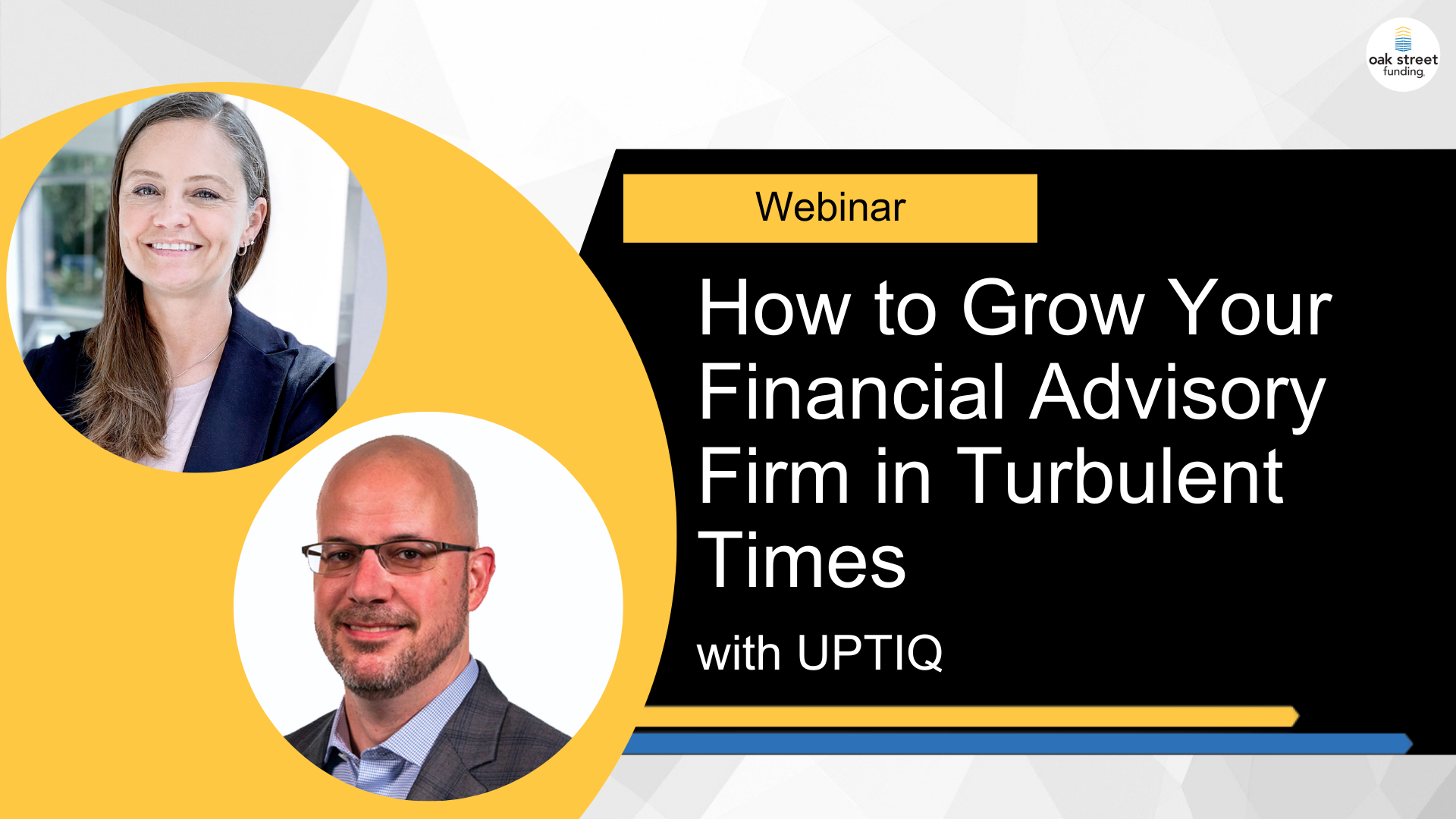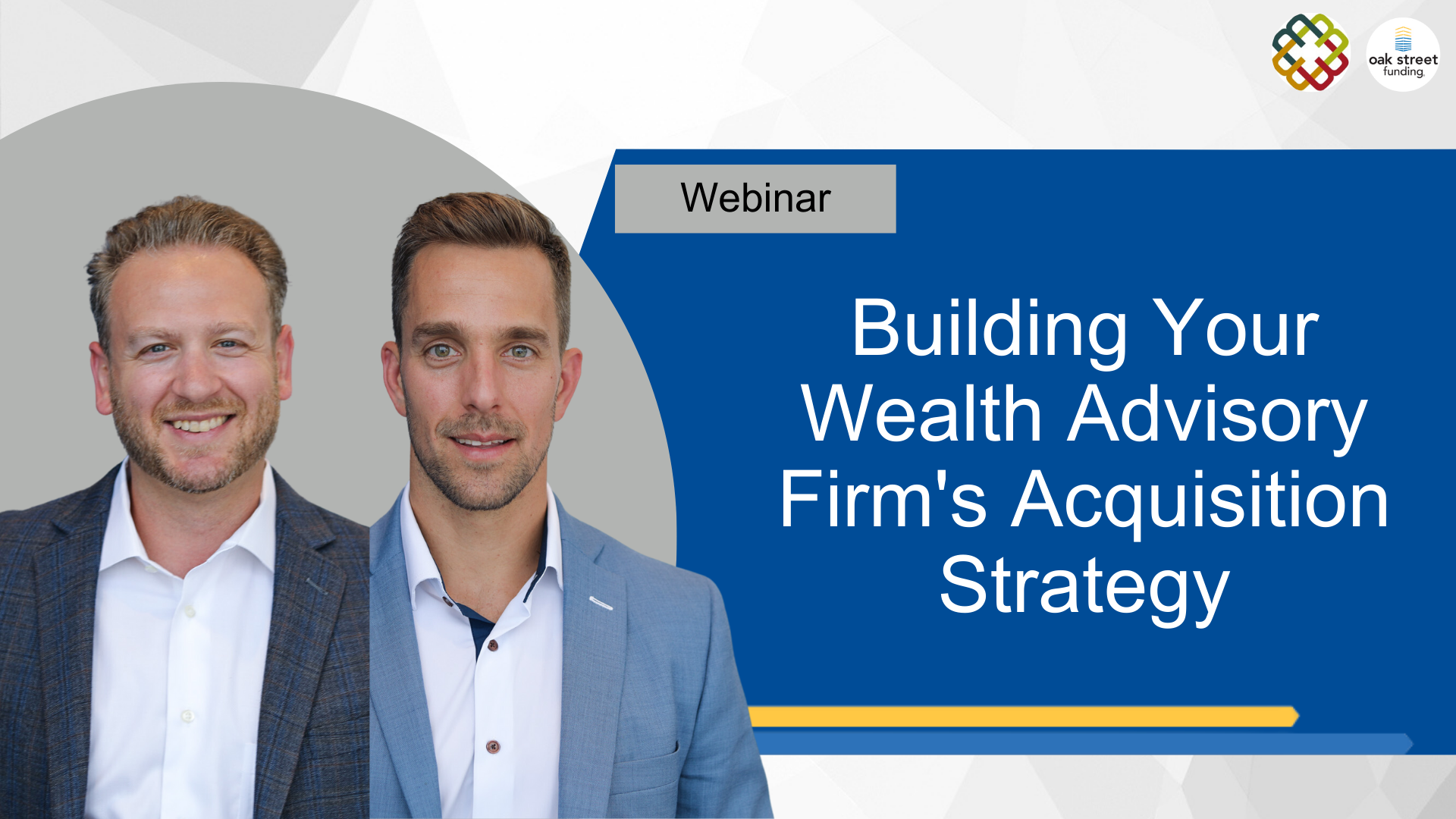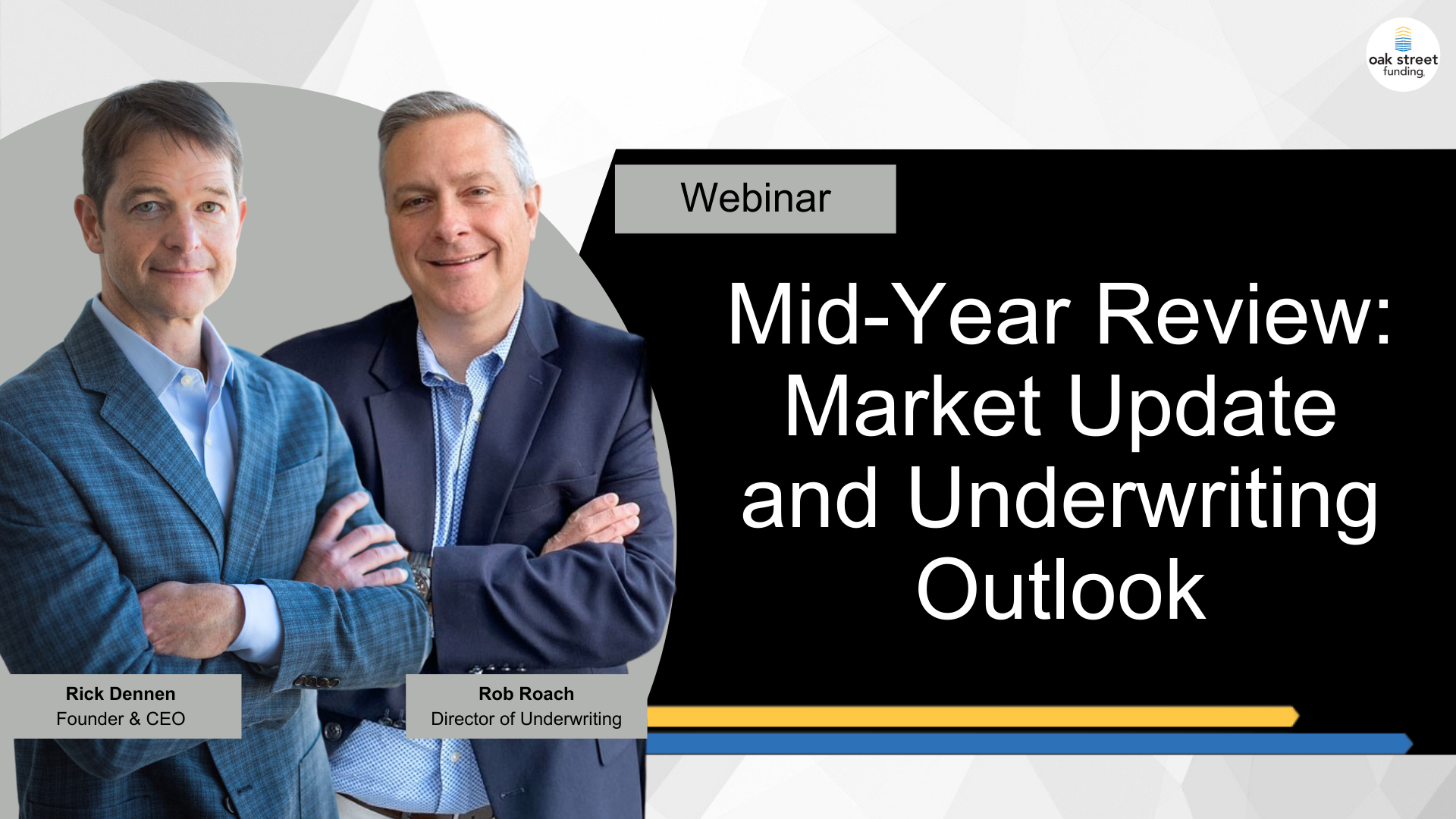Strategic Growth Through Acquisition
- 0.5
- 1
- 1.25
- 1.5
- 1.75
- 2
Kirsten Petras: Hello, everyone. And thank you for joining us today for our OnPoint webinar series. Today we'll be discussing ways to grow through acquisition, a very hot topic for all the businesses we serve. I'm Kirsten Petras with Oak Street Funding, and I'm happy to welcome two of our own Oak Street team members, Rob Roach, and Bruce Warren, both career lenders, experienced partners to a number of clients to help them grow using debt capital along the way. Bruce is one of our VPs of strategic sales, and for the past six years, Bruce has focused on working with those clients who are strategically growing through acquisition. While he's worked primarily with our advisor clients and our CPA clients, his history in the insurance space has made him a great add to the Oak Street team. Rob has been a member of our underwriting team for four years and is working often times with those same clients, with those same borrowing needs. If time does not allow your questions to be answered right now, be sure to follow our live experience on Twitter at @OSFunding, and you may see your answers appear there. And within the next couple of business days, you'll receive a follow up email with a link to today's webinar recording as well as contact information if you'd like to continue a private conversation. Well, thank you for your time today, Bruce and Rob. Rob, it's great to see you.
Rob Roach: Thank you. Great to be here.
Kirsten Petras: How about you Bruce? Having a good day so far?
Bruce Warren: Oh, great day. Thanks, Kirsten.
Kirsten Petras: It's always great to be together with you too. Well, I think before we get started talking about growing through acquisition as acquisition and succession are the leading reasons people come to us for funding. All the businesses we serve are experiencing active acquisition markets. In addition to these submitted questions, we're going to share a case study of a client we've worked with over the years who has diligently and successfully been realizing their strategy. So let's get started with more of a global comment. One of the questions submitted, I think is on the mind of many people, given the recent rate increase and the continued conversation of the anticipated rate increases and record inflation, this question is easily the first one we should answer, Bruce, I'm going to go to you. How do you see a potential recession or downturn in the economy affecting the number of agencies for sale and not only insurance agencies, but of financial advisory firms sales or CPA firms?
Bruce Warren: So this is my opinion only so this is not for, but I don't see recession or downturn in the near future. But what I think is driving most of the increase, one thing I can definitely say is I see in my verticals a huge increase in acquisitions and succession funding across the board. So from a financial advisory standpoint and accounting firms, they've traditionally just gone up organically every year. So five to 10% increases I'm seeing across the board. I don't really see them stopping right now. People are getting older. Baby boomers are selling their practices. They have to have succession internally to keep these legacy practices moving, that's what I see right now.
Rob Roach: I think there's always going to be opportunities regardless of what markets the markets may do. I think if some people see the opportunity to maybe sell in a high market, you'll have those folks and you'll have people who will say, wow, always deciding if this is the right time. So we're always looking for the best, but also planning for a downturn a little bit in everybody's book. So that's something that we take into account, but I really haven't seen much impact from that yet.
Kirsten Petras: Well, I would agree as someone who's talking to people on a daily basis about what's going on and while the cost of capital has been a driver for certainly the entrance of private equity and other sponsor type acquirers, the key demographics of what is also leading to the turn of these businesses is still there. People didn't get younger with a rate increase. People have not solved for their talent issue because of this rate increase. So I feel currently those factors are still outweighing that, and anyone who's focused on that long game of the overall benefit to the investment, a 25 basis point or maybe even a hundred basis point interest rate change should not just stop that strategy.
Bruce Warren: Oh, and it's definitely lighting the fire too. Because the calls are going through the roof right now about where do you see rates going? Can I still borrow money? Should I lock these rates in? If anything gets increasing activity right now.
Kirsten Petras: That's another point of view that I think is really important. So with that, if there are people sitting on the couch waiting whether buyer or seller, one of the questions that came in might be a great way for you to also start talking about the firm you want to share their story with today, how do you start a conversation with an organization you feel will be a strong acquisition?
Bruce Warren: To answer that question directly, it really comes down to who the borrower wants to buy. What are they looking for to add to their practice? So the conversation's going to start off, I used to tell people at a conference, go sit next to the oldest guy in a room, start talking to him about what he is doing with his practice. I wasn't trying to be facetious or anything, but that's usually a good place to start. You see the older people who want to transition out of the practices. And there's a question where you can say, I can help extend your legacy, and the serial acquirer that I was going to talk about today approaches practices like that. He's from the Midwest, a little more traditional type business owner and he tries to connect with these people, the owners, to find that connection instead of just climbing them in as a roll up type guy. So I'm glad Rob's here because he actually works on this client with me and it's a gentleman who I knew from my previous employer and he is what I call a tourist acquirer, which means he picks maybe one or two a year. They just fall into his lap through a series of brokers or people he knows in different areas that he is expanding to. And he was running out of runway with his current capital provider, which was an SBA lender. There were some restrictions that were coming up as far as how he wanted to structure deals versus what we could do. And I think that helped him a lot to show that we had the runway to provide that capital to do what he truly wanted to do, which was to a year to three a year to build his practice out to a 10 million plus revenue firm. So what we were able to do is explain to him how we structured deals which is heavily built on transition. So we lend money to the book of business, which means that's what we're really monitoring. And when you're buying somebody, we want to make sure that the transition of the book is effective that way clients don't leave, those revenues stay around and the value of the firm or enterprise value goes to the roof. So he was able to take our structures to negotiate with new sellers. So he would able to structure deals where the seller could stick around for a while, help with the transition, transition employees over, make sure that not competes were in place so we were protecting the book and business. And in the end, I think we've done over four years, what, eight transactions with him? He's built his firm from 4 million revenue to 14 plus.
Kirsten Petras: So now he's known as being someone who can execute, has a methodology to it, probably has a cultural definition of what it means to be acquired by his firm. How did he start some of those early conversations before that turn happened where people were seeking him out?
Bruce Warren: Simply he would use a broker network. Most of the conversations were introductions given to him through practice brokers. The other conversations were people he knew in his area, in his geographic area where I can't even state it for confidentiality, but he would know practices through just his basic work, through associations he was part of and he would just start conversations like, "Hey, how's the practice going? What are you looking to do?" And they would start the conversation about, I'm thinking about retiring. Conversations like that would come up with him.
Kirsten Petras: Rob, I know you've worked with some of our strategic insurance borrowers and they got a number of ways they're out there trying to make those same connections. Do you have any examples of any that you thought were a little bit outside of the box of normal, but prove to be effective?
Rob Roach: Yeah. I think one of the things, other than just asking someone, "Hey, you look old." There's other ways to do it. I think one of the things that we've seen successful is really just having an open mind about where you might actually meet folks. I think some of our people, our clients have met people in untraditional places sometimes and I think it's just having that open mindedness that, hey, is this somebody that might provide a good opportunity for me? And whether that's asking somebody, as Bruce just mentioned our client, how's your business going? Asking those type of questions to people that you might not initially think are sellers or somebody that's looking to move on, maybe from what they're doing, that's an effective way to do it as well.
Bruce Warren: Yeah. People got to get out of their comfort zones. Obviously accountants and financial advisors have tunnel vision when it comes to their focus on their practice but when you start talking about acquisitions, you have to get out of your comfort zone and really ask those probing questions. Where are you going? What do you want to do?
Rob Roach: Bruce, why... We talked about somebody that's just looking to maybe they need to move on just from a retirement standpoint, but there's other examples I'm thinking of a people that there's a multitude of reasons people might want to sell. And I think it's just keeping that in mind. I'm trying to think of an example where we have a client that, there was an opportunity just being opportunistic, is what I'm thinking about.
Bruce Warren: Divorce is one, I ran into that yesterday as a matter of fact. So that was always a fun conversation.
Kirsten Petras: Now, as people are doing this and meeting people, Rob, as someone who underwrites the risk attributed and associated with taking these kind of steps, what information should people be actually asking of the seller when they feel it's at that stage of really exploring the opportunity?
Rob Roach: And there's a traditional things that people would think of, financial statements, income statement, balance sheet, hey, help me understand what your clients look like. What is your client base? From an investment standpoint, it could be, what do your investors look like? Your clients there? What are your... are you taxed? Are you audit from a CPA standpoint? So there's things like that but one of the simpler things from an underwriting standpoint for somebody to ask and for me to understand is, how does this business fit into your current company? As Bruce was mentioning our client in the example, was very good at explaining why this is a strategic fit for us. How this is going to come into my business, how I think it's going to work out and why I think it makes sense. And I think that's one of the powerful things that the lender has to understand is how is this going to affect your business going forward. And what are the steps that you feel you're going to be able to do to really increase your profitability, really make this a successful merger.
Bruce Warren: So I always tell them to have their financial house in order, which means you have financial statements ready, readily available tax returns. But then there's also the ancillary things like non-compete agreements, engagement letters for clients, there's non-solicit agreements, accounting firms are known for people jumping ships or financial advisors because they get to protect what they have internally. Those we ask for quite a bit these days, and I think that's something they need to be aware of. Intellectual property rights are very big right now. So I think that's something that they need to look out for when they need to provide that information.
Rob Roach: And I think that's something you just hit on, one of the things as we look at, maybe some clients who have struggled with acquisitions, one of the reasons sometimes they do is the sellers, they might look for something else to do later on and it's making sure you're protected as the firm making the acquisition, you're protected in protecting the book you just acquired, I think it's very important.
Kirsten Petras: So, Bruce, you talked about the transition of your case study here from having a more traditional CPA structure, opening it up by coming over and working with us to allow them to do more deals with different structures. Do you want to share a little bit about how this firm and maybe some other firms you're working with are structuring deals?
Bruce Warren: So as a lender on the CPA side, we max out at about 60% against purchase price, but a lot of them are taking that to the next level, which is actually putting less down upfront and having more of an earn out type structure on the back end where it's subject to retention of revenues. So I think that helps the seller to increase their price because they're getting paid over time. But it also really helps in preservation of the book of business. We love that. The less down upfront obviously as a lender is great. That's what Rob says, some people say, sales guy, let's do a hundred percent, but that doesn't happen.
Rob Roach: And I think absolutely keeping that in mind and keeping that, keeping a sense of alignment between the buyer and the seller is very important, especially in that initial phase where you're introducing new clients to a new person maybe, and keeping the seller as an advocate, as much as you can, can be very beneficial.
Bruce Warren: Yeah. The win, win, win scenario is always the best. Everyone thinks the bank always wins. We get paid, but the seller's got to win, the buyer's got to win and we got to win. The alignment is so critical. The seller gets a maximum for his sale. The buyer gets what he wants. He gets people, he gets revenues, he gets profitability and then we get paid ours, that actually refers that we get paid first.
Kirsten Petras: And for the business owner listening today in the end, really, they're also mindful of the client winning at the end of this. So to your point, Rob, what is the benefit of joining forces by acquiring this firm? Are they going to be able to offer more products and services to their clients? Are they going to be able to give them something they can't now? If it is simply geographical, what are they gaining? What can they provide those clients? So the heart of everybody we serve really comes down to the relationships between the businesses and the clients themselves so maybe it's win, win, win, win.
Bruce Warren: I left out a win, sorry.
Rob Roach: Maybe two more in there somewhere.
Kirsten Petras: One plus one plus one plus one. Two questions. One starts with what are current multiples you're hearing in the businesses we serve and then a quick follow up is going to be how competitive is the market right now? And I think those go together. Rob, in the insurance side, what are some of the current multiples you're seeing and what are factors also that might change those from the higher end to the lower end?
Rob Roach: Some of the multiples we're seeing, they're on the high end. We used to say, if I just wanted to do a back of the napkin, kind of what do I think this is worth? You would maybe say maybe two times commissioned or something like that, who knows, but now we're seeing multiples and I'm hearing from clients that are... they're getting offers for much more than that. Whether it be a multiple of revenue or a multiple of EBITDA, we're seeing those multiples continue to climb. And that's a function, I think, as we look to, is that seller debt on top of that to help us get to those multiples? Or what is it? So they're increasing and what helps those increase are, and Bruce can speak a lot to this as well, is that the more in revenue you get, the bigger you are, sometimes the higher the multiples go as you become more valuable out in the marketplace.
Bruce Warren: Yeah, recurring revenue streams are very valuable these days. So the accounting side, multiples are anywhere from 0.7 revenue times revenue to 1.3 times. And it depends on profitability location. There's a lot of factors that go into that.
Kirsten Petras: Well, and there's a number of studies in the advisory world. One, I recently saw really breaks that business down into three different levels, small, mid, and large. And I would agree that multiple gets larger up stream and there's a number of things that are driving that. In the insurance space though, to your point, I've been here for quite a while and that trend for that multiple increase has been going the entire time I've been here. And I don't know that there's any signs of it actually slowing down. Structures have changed to accommodate it. If somebody is buying a 10 time EBITDA multiple, a lender cannot lend a 10 time EBITDA loan. So that structure starts to play a role in how much third party debt can be part of the structure. How much the seller needs to retain and how much equity they need to put in to the deal. And so in the advisory business and the CPA business, Bruce, thank you for sharing with your case study, what some of that balance has looked like. Do you see any signs of that slowing down in those marketplaces?
Bruce Warren: No, it's going to keep steadily increasing. There's a lot of practices. A lot of people want to buy them. Organic growth is more and more difficult, fee structures, there's a lot of compression in that area. So they find lower billing fees on the accounting side and they try to up them when they buy them. So they're trying to upstream themselves from services, logistics, everything is across the board is trying to become more efficient.
Kirsten Petras: So for someone, if you want to share some more of the example that you have with us today, I welcome it. I think people are interested in knowing how to buy more than one. This is an example where we saw growth, I think you said from 4 million to 14 million in revenue. But I think there's just as much opportunity for someone who has smaller opportunities, an insurance agent that just has maybe a hundred clients or an advisor that maybe only has 50 million of AUM.
Bruce Warren: With any serial acquire or someone that wants to be on the strategic path, you have to have a great team. So in this case, our borrower had a really good attorney that knew acquisitions, documentation for that. He had internal staff that could help with integration, but he had to become more refined as he started doing more and more. So there has to be, especially if it's in multi- states, the integration team was critical to that, to integrate the technology, all the systems, all the employment from an HR standpoint. So I think that's one of the big things that these acquirers are traits that they have.
Rob Roach: And I think that's right. One of the things in this particular example as well, having someone who's really thought through the process. One of the toughest things for us is someone who makes an acquisition and it goes well, and now they want to make the second one, but they really haven't thought about how that's going to come and affect their business. It's just, hey, here's an opportunity. I think we should make this, I'm not really sure how it's going to turn out, but I think it's going to be great. What we're going to ask is, again, we just talked about it before, how is this going to affect your business? How are you going to bring it in? What void does it fill? Does it fill a void of talent? Because sometimes people acquire for talent. Does it fill a geographical space? Does it fill a business line? There's a lot of reasons for strategic acquisitions and just having thought through that process, which this person is very good at. Here's how it's going to fit, and here's where I think I have a need and here's how it's going to happen. I'm going to take, and I'm going to take this manager to run this section because that's important as, especially we talked about expanding geographically it's how does someone on a smaller scale, how does a person who's been making all the decisions? How do they expand their enterprise and continue to manage it in an effective way?
Bruce Warren: Yeah. And this gentleman was really doing it hodgepodge before he came in with our company. So he was just grabbing stuff and just buying it without thinking through it. And then we've got a hold of him and started training him how to think about this stuff. So it really helped. And he's gotten efficient. He's gotten really good at integration. And now he's able to bid on bigger deals too, just because of the reputation he's getting.
Kirsten Petras: To your point, the acquisition for talent right now, this is an emerging conversation, but something that everyone should be considering in that everybody's talking about the lack of talent. We actually just recently did a piece where the name of it is called acqui-hire. So there's also a benefit to having that experience attorney. People might sell to you because that legacy is really important, regardless of that multiple, it doesn't mean you're going to get something pennies on the dollar compared to some of the guys that are out there with big checkbooks, but they see so much value you in that. But their value also comes with taking care of their people and you've got to have your team to do that. Bruce, have you ever seen an example though, of someone you've talked to, they have this whole plan and then nine months goes by and they find nothing and then they just call you with something wacky and you have to tell them like, this is not what you originally set for?
Bruce Warren: Pretty much everyday. They get desperate, I call it the desperate mode. Where they just need to have fill this, need they're like addicted to, I have to buy one and they're just grabbing anything randomly. And unfortunately this was how this gentleman was when I knew him at my old place. So it's a discipline. They have to be disciplined about it. And you just have to stick with what you're going to do.
Rob Roach: As you were talking about why... What are maybe sellers looking for? And I think a lot of times sellers are looking for someone that... I have a list to clients that I can't seem to fulfill a need for right now. And so maybe I'm starting to lose some of those clients. Maybe I'm just getting tired of not being able to fulfill that need so finding a partner that maybe has a need, whether it's a CPA firm looking for and some investment or vice versa, I think that's what we're seeing a lot of times as well, when we talk about strategic buyers are people who are looking to, I can't fulfill that need, if I do it's going to take me spending a lot of capital. It's going to take me hiring a lot of folks. Maybe it's time for me just to partner with someone else.
Kirsten Petras: So the most recent thing that's triggering a lot of these questions is an interest rate change. It was only a couple months ago that we saw a true spike in activity because of an anticipated tax change. Do you see any future changes that people aren't talking about that may trip up somebody in the process?
Bruce Warren: The only changes I can think of is some of the big geopolitical things go going on right now and how that might impact, I don't know the existence of the world at this point, but that's scaring a few people, but I think for the most part it's going to stay steady. I don't see recession in the future. The rates are going to keep going up. That's just except that they were at the lowest place they've ever been for many years and they're going to go up. They have to, we have to contain inflation and all this other thing, I don't think the acquisition markets will stop. Cost of capital will be more that's for sure.
Rob Roach: Yeah. But on the cost of capital, I don't think that I've ever looked at a transaction and said, if the rate was 50 basis points lower, it would make it a bad transaction, a good transaction or vice versa. I think the rates is something you have to take into account and it's something that we model for, but it's something that I don't think that will make a deal bad or good just looking at the interest rate. There's a lot of other things that go into that.
Bruce Warren: You have to do the analysis cash flow as cash flow and debt is part of it. Seller debt's part of it. Profitability is part of it. Paying for employees is part of it. So you just have to model that in when you're buying something.
Kirsten Petras: Do you have anything as it pertains to this example that you watched happen or you were part of happening, that you saw something that really stood out in the structure and you thought this is a good, this is going to make this work?
Rob Roach: Yeah. For me in this example, as Bruce mentioned, when we did the first couple of transactions, it was a new client for us. We were a new partner for that person and it was getting acquainted to this is how we structure things and this is why we think it's going to be successful if we do it this way. And I think that takes some getting used to, I think that in this example as well, where we had someone that was purchasing firms in different areas of the country, one of the things we had to make sure of, the what do you have the management capacity to do this? As you had someone who was largely making all the decisions. And so I think that's one of the things that we had to look at and then we saw people the surrounding, that were surrounding themselves with, and being very purposeful on how they implemented things. And I think that made the last several go a lot smoother. And I think that's, as we look at things, when did I think, oh, wow, this is really going to work. This is really going to be a great client. Good, great fit for us. I think that's when we all got aligned on how much, what is the appropriate loan to value? What's the appropriate seller note? What's the appropriate structure for something like this? And then how can I show you how I'm going to implement this and get everybody on board that, especially projections, projections are something that we ask for. And I think that's a result of that process of someone saying, this is how I've thought it through. Here's what I think will happen in terms of revenue. Here's what I think is I'm going to onboard some expenses and here's how I think I'm going to do it. Now, ultimately, we realize it's not going to be perfect. We realize there's going to be some up and down, ups and downs with that, which is why our structure helps us. It helps our borrowers prepare for those little ups and downs as they roll a new businesses in. So I think those are the things that I look for.
Bruce Warren: I concur.
Rob Roach: And you concur and again, we're on the same page. Great.
Kirsten Petras: Well, with those structures, a question that came in, covenants. When, at what time, at what size do covenants, financial covenants come into play and what are those typical covenants?
Rob Roach: Financial covenants are really, from a banking standpoint, it's something that as we think of our client and say where in our portfolio, in our realm of clients do we think that this client fits and that's what we use for pricing, that's what we use for structure, for a lot of different things. And what our covenants do. Covenants allow us to put a stake in the ground really and say, this is where we think we are. And those covenants are you usually a debt service coverage covenant, a leverage covenant, oftentimes something like funded debt EBIDA, something like that that gives us a point in time, this is where we think we are. Really, we put those covenant, we place those covenants to help us on deals that are really, a million dollars and up. And something we monitor normal quarterly, or semi-annually, something like that. So what we do on those quarters, we really look at the performance, especially on acquisitions, it helps us watch how the acquisitions are unfolding as we put that stake in the ground. And then the next quarter we look at it, well, are we above where we thought we would be? Which is great, if we are. Things are progressing as we thought they would. And we really have no issues. If we're below that, all of a sudden it gives us the time to pause and say, why are we below that number? What's happened? Is it something operationally that's changed? Is it something that didn't get implemented as we hoped? Or is it something that, hey, this is something we just missed. It's a one time thing. It's over, it's paid for and drive on. So it helps us to monitor where we thought we were, where we're going and I think it helps our clients too, as we put that stake in the ground to realize where they're at.
Kirsten Petras: Another question that we had was we talked about how we're funding these initial purchases. The question is about paying seller payments. So a seller is going to hold a note or some sort of earn out, are we able or how have you been able to come back and assist with some of that?
Bruce Warren: So if it's an earn out structure or seller note, if the firm itself that we're lending to is profitable enough, we can literally fund those earn out payments. So if it's maybe year one, two, three, that there's payments due, we are actually able to capital stack and fund those. So if they don't want to pay it out of cash flow, we can actually do that through a long extended capital facility.
Kirsten Petras: Okay.
Rob Roach: And I think that's where, from the underwriting stand point of that we have those seller notes in place to really bring alignment, to really make sure that that acquisition goes the way we hope it goes. And that time period, really that first year is very important as things get implemented. And so to be able to watch that go through, to be able to monitor that, I think that's where, again, spending time on the projections is so important and making sure those projections are right, because that helps Bruce as he comes into the office the next day after an acquisition says, well, let's redo the seller note. That helps us to figure out what does that look like? And really helps us to, as we try to formulate a plan as well for our clients and help them with it. Getting involved early and watching that so we have a plan for maybe how those seller payments get paid. Are they getting get paid out of cashflow? Are we going to talk to Bruce about maybe looking at financing those? And so I think, again, it's just that being very intentional about planning how this acquisition is going to be rolled into your firm.
Bruce Warren: Yeah. And these are the questions that as we're part of the team too, we're the partner with the acquirers, so in addition to their attorney, their insurance people, they have us as a lender and a partner to go through these questions.
Kirsten Petras: Bruce, any final thoughts or final intel to share about this firm we've been following from their journey of 4 million revenue to 14 million?
Bruce Warren: No, a firm like this is they're on the cusp of actually maybe going to the next level, which is either a major merger with the firm of similar size, or just stepping up to the next level where he removes themselves from the actual day to day and becomes focused completely on acquisitions. So right now, he's doing a balancing act and you can do my conversations with him, I can see that and he doesn't know which way to go. So I'm waiting for him to make a decision on that.
Rob Roach: I absolutely agree. And I think one of the things is as I think about firms that we've worked with that have done multiple acquisitions, it's... be patient is one of my things I know it's really hard for folks to do, but some of it is. Be patient, be deliberate, really put some thought into it, helping us understand your thought process and realizing it and I think we do a good job of realizing not everything's going to be perfect when you make an acquisition, there's going to be some bumps in the road. And it's being able to show that we're able to withstand those bumps in the road, being able to show that we can plan for some of them. And I think that's important when we start looking at these.
Kirsten Petras: Thank you to the registrants who submitted your questions today. And as I mentioned, and if we're unable to get to them, we will have some more Q and A available, that can be sent out. And we can also just reach out to you personally. Don't forget to make it, to listen to our On Point podcast. It's going to become one of your favorite sources of stories and information from business owners and influencers like you. You can listen to our On Point podcast anywhere you listen to your other favorite podcast. Thank you for joining us and be on the lookout for your invitation to our April webinar.
DESCRIPTION
Bruce Warren, VP Strategic Markets Sales at Oak Street Funding, and Rob Roach, Commercial Underwriter at Oak Street Funding, came together for a conversation about strategically growing your business through acquisitions. They also answered questions you submitted during registration about becoming a "serial acquirer." You can also follow along at @OSFunding on Twitter. The conversation was moderated by Kirsten Petras from Oak Street Funding.
Today's Guests

Robert Roach
